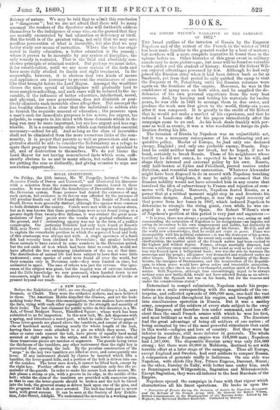ROYAL INSTITUTION.
On Friday, the 25th instant, Mr. W. Pengelly, lectured "On the Devonian Fossils of Devon and Cornwall," and illustrated his discourse with a selection from the numerous organic remains found in those counties. It was stated that the foundations Of Devon'shire were laid in the Devonian system. Some persons had denied the existence of any such system, but evidence in its favour was afforded by the presence of 187 peculiar fossils out of 339 found therein. The fossils of North and South Devon were generally distinct, although five species were common to both dividend of the county. Corals were met with in various strata, but as it was known that these productions were never found living at a greater depth than twenty-five fathoms, it was evident the great accu- mulations of fossi pecies were the resulte of a gradual subsidence of the ground, and t' ientombing agency was not in the form of a sudden catastrophe. Ow ?articular Trilobite had only been found at Knowle Hill, near New-t4 _ and the lecturer put forward an ingenious hypothesis to explain the remarkable position in which the separated head and body of this crustacean was always met with. A single specimen of a fossil fish had recently been obtained in Devonshire ; the speaker believed these animals to have existed in some numbers in the Devonian period, bat the red oxide of iron which had been fatal to coral life, would not have affected the free swimming inhabitants of the sea at that time. The distribution of animal life had been subject to laws that were little understood ; some species of coral were found all over the world, but their remains only in Devonian rock—they were limited in time, but unlimited in space. The case of others was just the reverse. Our igno- ranee of the subject was great, but the inquiry was of extreme interest, and the little knowledge we now possessed, when handed down to our successors, might lead to the discovery and comprehension of truths at present beyond our reach.


























 Previous page
Previous page